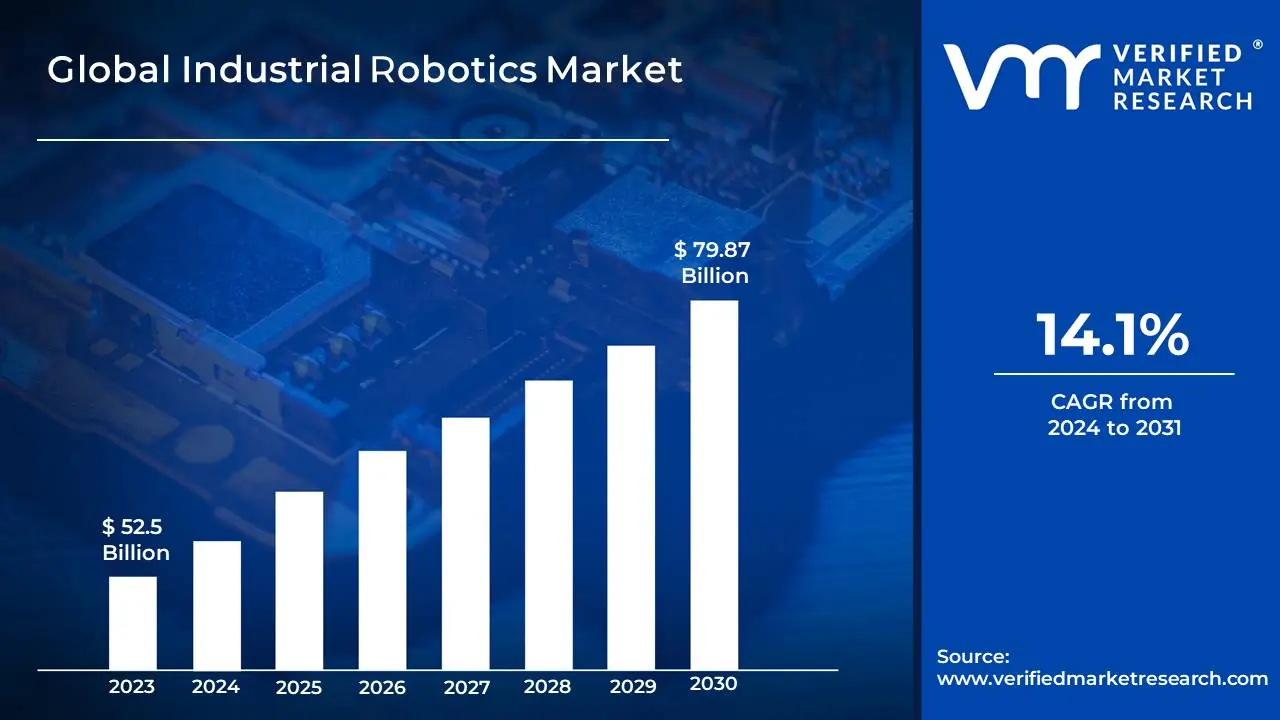
Industrial Robotics Market to hit $ 60.5 billion by 2030: Verified Market Research
The Global Industrial Robotics Market size was valued at USD 26.72 Billion in 2023 and is projected to reach USD 60.56 Billion by 2030, growing at a CAGR of 10.6% from 2024 to 2030.
The global industrial robotics market refers to the industry encompassing the design, manufacturing, and deployment of robotic systems specifically tailored for industrial applications. Industrial robots are programmable machines that automate various tasks within manufacturing and production environments, such as assembly, welding, painting, packaging, and material handling. These robots are equipped with specialized tools, sensors, and software to perform specific tasks with precision, speed, and reliability. They can operate autonomously or under human supervision, depending on the complexity of the task and the level of automation required.
The market for industrial robotics is driven by the growing demand for automation across industries to improve productivity, efficiency, and safety while reducing labor costs. Key players in the industry include manufacturers of industrial robots, integrators who customize and install robotic systems, and software developers providing programming and control solutions. The market encompasses various types of industrial robots, including articulated robots, SCARA (Selective Compliance Articulated Robot Arm) robots, delta robots, Cartesian robots, and collaborative robots (cobots). It also includes related components and services such as robotic arms, end-effectors, vision systems, and training and maintenance services. The global industrial robotics market is characterized by technological advancements, ongoing research and development, and increasing adoption across diverse industries worldwide.
Request PDF Sample Copy of Report: (Including Full TOC, List of Tables & Figures, Chart) @ https://www.verifiedmarketresearch.com/download-sample?rid=11753
Industrial Robotics Market Drivers
The Industrial Robotics Market has seen significant growth due to several key drivers:
- Increasing Demand for Automation: The need for increased productivity, efficiency, and cost-effectiveness in manufacturing and production processes is driving the adoption of industrial robots. Automation helps companies streamline operations, reduce labor costs, and improve quality and consistency.
- Technological Advancements: Continuous advancements in robotics technology, such as artificial intelligence, machine learning, and advanced sensors, are enhancing the capabilities of industrial robots. These innovations enable robots to perform more complex tasks with greater precision and flexibility.
- Growing Industrialization: Rapid industrialization in emerging economies, particularly in sectors such as automotive, electronics, and pharmaceuticals, is fueling the demand for industrial robots. These countries are investing in automation to improve their manufacturing competitiveness and meet the demands of a growing consumer market.
- Rising Labor Costs: Increasing labor costs, especially in developed countries, are prompting companies to invest in automation solutions to reduce dependency on manual labor. Industrial robots offer a cost-effective alternative for repetitive and labor-intensive tasks, leading to long-term cost savings.
- Focus on Workplace Safety: Industrial robots help improve workplace safety by handling hazardous tasks that pose risks to human workers, such as welding, painting, and handling heavy machinery. By deploying robots in these environments, companies can minimize the risk of accidents and injuries.
- Shortage of Skilled Labor: The shortage of skilled labor in certain industries, coupled with an aging workforce, is driving the adoption of industrial robots as a solution to fill the gaps in the workforce. Robots can perform tasks that require specialized skills or are physically demanding, thereby reducing the reliance on skilled workers.
Industrial Robotics Market Limitations and Restrictions
The Industrial Robotics Market faces several limitations and restrictions, including:
- High Initial Investment: The upfront cost of acquiring and implementing industrial robots can be substantial, especially for small and medium-sized enterprises (SMEs). This can act as a barrier to adoption, particularly for companies with limited financial resources.
- Complexity of Integration: Integrating industrial robots into existing manufacturing processes can be complex and time-consuming. It may require specialized expertise in robotics programming, system integration, and process optimization, leading to additional costs and challenges.
- Lack of Flexibility: Traditional industrial robots are designed for specific tasks and may lack the flexibility to adapt to changing production requirements. Reconfiguring or reprogramming robots to handle new tasks or product variations can be time-consuming and may require additional investment in training and equipment.
- Safety Concerns: Ensuring the safety of human workers working alongside industrial robots is a critical concern. Robots can pose risks of collisions, entrapment, and other hazards if not properly designed, programmed, and monitored. Compliance with stringent safety standards and regulations adds complexity and cost to robotic deployments.
- Maintenance and Downtime: Industrial robots require regular maintenance and servicing to ensure optimal performance and uptime. Unplanned downtime due to equipment failures or maintenance issues can disrupt production schedules and incur additional costs for repairs and lost productivity.
- Regulatory Compliance: Compliance with industry regulations and standards, particularly in highly regulated sectors such as automotive, aerospace, and healthcare, can pose challenges for industrial robotics deployments. Meeting regulatory requirements for safety, quality, and environmental impact adds complexity and cost to robotic systems.
- Ethical and Social Implications: The widespread adoption of industrial robots has raised concerns about job displacement, workforce retraining, and the socioeconomic impact of automation on communities. Addressing these ethical and social implications requires careful consideration and proactive measures from policymakers, industry stakeholders, and the broader society.
Get a Discount On The Purchase Of This Report @ https://www.verifiedmarketresearch.com/ask-for-discount?rid=11753
Top Key Players in Industrial Robotics Market
The major players in the Industrial Robotics Market:
- ABB Ltd.
- Yaskawa Electric Corporation
- Denso Corporation
- Fanuc Corporation
- KUKA AG
- Mitsubishi Electric Corporation
- Nachi-Fujikoshi Corporation
- Panasonic Corporation
- Seiko Epson Corporation
- Universal Robots A/S
- Daihen Corporation
Segmentation for a report on “Industrial Robotics Market”:
Segmentation analysis for the Industrial Robotics market involves dividing the market into distinct segments based on various criteria such as type of robot, industry vertical, application, and geographic region. This analysis helps stakeholders understand the diverse needs and requirements of different customer segments within the market and develop targeted strategies to address them effectively.
- Type of Robot:
-
-
- Articulated Robots
- Cartesian Robots
- SCARA (Selective Compliance Assembly Robot Arm) Robots
- Delta/Parallel Robots
- Collaborative Robots (Cobots)
- Others
-
- Industry Vertical:
-
-
- Automotive
- Electrical and Electronics
- Metal and Machinery
- Chemical, Rubber, and Plastics
- Food and Beverage
- Healthcare and Pharmaceuticals
- Aerospace and Defense
- Others
-
- Application:
-
-
- Material Handling
- Welding and Soldering
- Assembly and Disassembly
- Painting and Coating
- Inspection and Testing
- Packaging and Palletizing
- Others
-
- Geography:
-
- North America
- Europe
- Asia Pacific
- Latin America
- Middle East and Africa
Industrial Robotics Market Scope of the Reports
The industrial robotics market is witnessing significant growth owing to the increasing demand for automation across various industries such as automotive, electronics, healthcare, and manufacturing. With advancements in technology such as artificial intelligence, machine learning, and the Internet of Things (IoT), industrial robots are becoming more sophisticated and versatile, capable of handling complex tasks with precision and efficiency. Moreover, the rising labor costs, coupled with the need for improved productivity and quality control, are driving the adoption of industrial robots globally. These robots are increasingly being utilized for tasks such as material handling, assembly, welding, painting, and inspection, thus streamlining operations and enhancing overall efficiency for businesses.
Furthermore, the industrial robotics market is expected to witness further growth with the ongoing trend towards Industry 4.0, which emphasizes the integration of digital technologies into manufacturing processes. Industry 4.0 initiatives promote the use of smart factories equipped with advanced automation and robotics systems that can communicate and collaborate seamlessly with each other. This integration enables real-time monitoring, predictive maintenance, and data-driven decision-making, thereby optimizing production processes and reducing downtime. Additionally, the emergence of collaborative robots, or cobots, designed to work alongside human workers in a safe and efficient manner, is expanding the potential applications of industrial robotics across various industries, driving market growth even further.
Table of Contents (TOC) for a report on “Industrial Robotics Market”:
1. Executive Summary
- Key Findings
- Market Overview
- Competitive Landscape
2. Introduction
- Research Objectives
- Research Methodology
- Scope and Segmentation
- Assumptions and Limitations
3. Market Overview
- Market Definition
- Market Size and Growth
- Market Dynamics
- Drivers
- Restraints
- Opportunities
- Challenges
- Porter’s Five Forces Analysis
- PESTLE Analysis
4. Industrial Robotics Market, by Type of Robot
- Articulated Robots
- Cartesian Robots
- SCARA (Selective Compliance Assembly Robot Arm) Robots
- Delta/Parallel Robots
- Collaborative Robots (Cobots)
- Others
5. Industrial Robotics Market, by Industry Vertical
- Automotive
- Electrical and Electronics
- Metal and Machinery
- Chemical, Rubber, and Plastics
- Food and Beverage
- Healthcare and Pharmaceuticals
- Aerospace and Defense
- Others
6. Industrial Robotics Market, by Application
- Material Handling
- Welding and Soldering
- Assembly and Disassembly
- Painting and Coating
- Inspection and Testing
- Packaging and Palletizing
- Others
7. Industrial Robotics Market, by Region
- North America
- Europe
- Asia-Pacific
- Middle East and Africa
- Latin America
8. Competitive Landscape
- Market Share Analysis
- Competitive Scenario
- Company Profiles
- Recent Developments
9. Conclusion
10. Appendix
- Glossary of Terms
- List of Abbreviations
- References
For More Information or Query, Visit @ Global Industrial Robotics Market Size And Forecast
About Us: Verified Market Research
Verified Market Research is a leading global research and consulting firm with over 10 years of experience providing advanced analytical research solutions, tailored consulting and in-depth data analysis to individuals and companies seeking accurate, reliable and timely research. Data and technology consulting. It provides insights into strategic and growth analysis, the data you need to achieve business goals, and helps you make key revenue decisions.
Our research works as partners to provide our clients with accurate and valuable information to help them make better data-driven decisions, understand market forecasts, capitalize on future opportunities and help optimize efficiency. The industries we cover span a wide range of industries including technology, chemicals, manufacturing, energy, food and beverage, automotive, robotics, packaging, construction, mining and gas. etc.
Verified market research help you understand comprehensive market indicator factors as well as current and future market trends. Our analysts have extensive expertise in data collection and management, using industry methodologies to collect and examine data at every step. They are trained to combine the latest data collection techniques, superior research methodologies, specialized knowledge, and years of collective experience to produce informative and accurate research results.
Having served over 5,000 clients, we provide trusted market research services to over 100 global Fortune 500 companies, including Amazon, Dell, IBM, Shell, Exxon Mobil, General Electric, Siemens, Microsoft, Sony and Hitachi. We provided it. We work with some of the world’s leading consulting firms, including McKinsey & Company, Boston Consulting Group and Bain & Company, delivering customized research and consulting projects for companies around the world.
Contact US:
Mr. Edwyne Fernandes
Verified Market Research
Mr. Edwin Fernandez
Verified Market Research
USA: +1 650 781 4080
APAC: +61 485 860 968
EMEA: +44 788 886 6344
Email: [email protected]
Website:- https://www.verifiedmarketresearch.com/
Top Trending Reports from Verified Market Research
Malaysia Robotics Market Size, Scope And Forecast
Adaptive Robotics Market Size, Scope And Forecast
Robotics Market Size, Scope And Forecast
Service Robotics Market Size, Scope And Forecast
Cloud Robotics Market Size, Scope And Forecast


